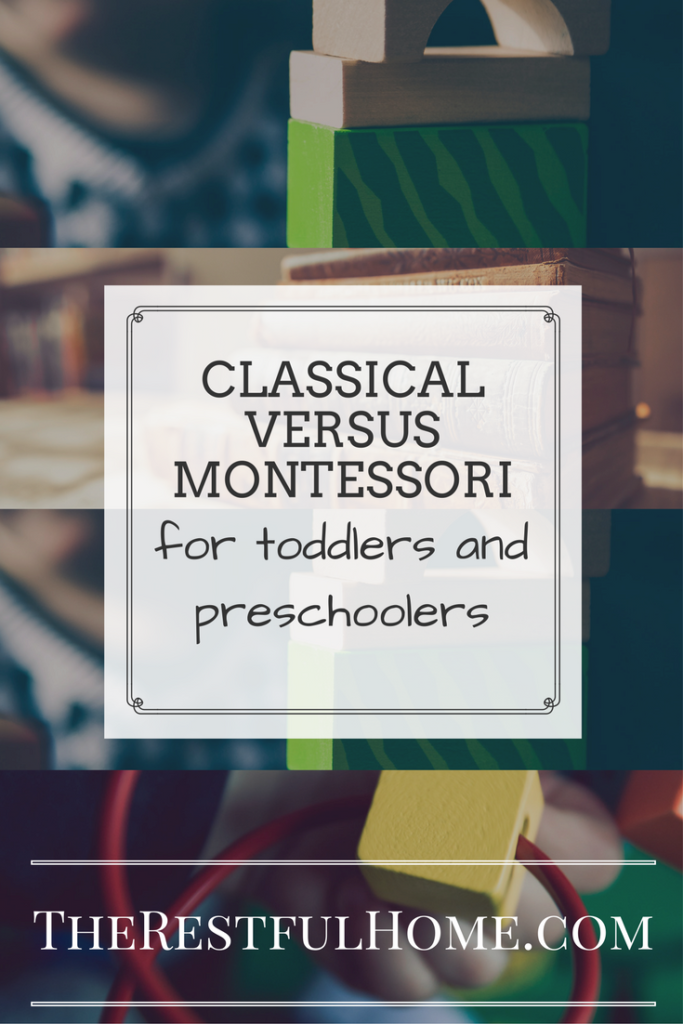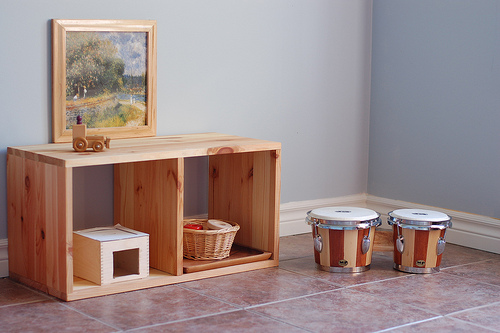 Classical versus Montessori education—could there be two philosophies more different? One is very structured, with a formal progression from early ages to high school. (Read Dorothy Sayers’ influential essay, “The Lost Tools of Learning,” to better understand the trivium concept of classical education.) Classical education attempts to use rigorous, structured academics to train students to be individual thinkers by the time they reach their teens. (Not at the mercy of every advertiser or smooth talker around the corner.) The other (Montessori) is student-centered, letting students choose what they will focus on from an array of teacher-presented topics. (Read my article on Montessori versus Waldorf to get a simplified description of Montessori.) Although it allows for children to make choices, its goal is to make children grow up into good members of a community (perhaps not as individualistic as classical thinking).
Classical versus Montessori education—could there be two philosophies more different? One is very structured, with a formal progression from early ages to high school. (Read Dorothy Sayers’ influential essay, “The Lost Tools of Learning,” to better understand the trivium concept of classical education.) Classical education attempts to use rigorous, structured academics to train students to be individual thinkers by the time they reach their teens. (Not at the mercy of every advertiser or smooth talker around the corner.) The other (Montessori) is student-centered, letting students choose what they will focus on from an array of teacher-presented topics. (Read my article on Montessori versus Waldorf to get a simplified description of Montessori.) Although it allows for children to make choices, its goal is to make children grow up into good members of a community (perhaps not as individualistic as classical thinking).
How would you begin preparing your toddler for an academic education founded on either of those philosophies?
Classical Preschool-in-Your-Home Ideas:
 *Train your child to respect authority and to be able to sit still. This doesn’t mean you make your 2-year-old sit for hours of miserable boredom. This means short practice times, like, “for 20 minutes you need to sit and play quietly on this blanket without going anywhere else.” I heard a lady speaking on this on a Spanish radio station and really want to try her practical ideas for training even babies (close to 1 year old) to learn to respect boundaries and listen to Mommy.
*Train your child to respect authority and to be able to sit still. This doesn’t mean you make your 2-year-old sit for hours of miserable boredom. This means short practice times, like, “for 20 minutes you need to sit and play quietly on this blanket without going anywhere else.” I heard a lady speaking on this on a Spanish radio station and really want to try her practical ideas for training even babies (close to 1 year old) to learn to respect boundaries and listen to Mommy.
*Read aloud classics that will help lay a literary foundation for your child. The Bible, of course. Mother Goose nursery rhymes, Peter Rabbit stories, etc.
*Help children memorize short rhymes, Bible verses, the alphabet song, etc. I think this is a good idea even if the super-structured classical model is not for you.
For many more ideas, check out THIS BLOG.
Montessori Preschool-in-Your-Home Ideas:
*Offer different “work” baskets or activity trays on a shelf for your toddler. One could contain items of the same color but different textures (something as simple as long ribbons for babies to play with and chew on). One could have a self-correcting puzzle (that means that it only works one way and the child can figure that out by seeing that you can’t push a square into a round hole).
*Instead of buying a play kitchen set, let your child work beside you on his/her own little table with real kitchen implements. Use common sense. Please don’t let your toddler have knives or other sharp objects, and avoid giving him fragile dishes. “Real kitchen implements” means things like measuring cups and bowls and wooden spoons.
I loved seeing the pictures on Three Oaks of her childrens’ Montessori-inspired bedrooms/playroom. For example, this one showing activity shelves: 
Which one works for you?
Do you enjoy memorizing facts through songs with your children? Is it important to you that they see you as a strong authority figure when they are still very young? Do you value history, Latin, and classical literature? Are you organized—or, on the opposite end of the spectrum, do you need a very organized system to keep in check your fly-by-the-seat of your pants mentality? If your answer to those questions was yes, then classical education might be a good choice for you.
If you prefer letting your child learn through discovery and play and believe in giving him choices from a young age, Montessori may be a better fit.
Is it possible to combine Classical and Montessori ideas for children?
I think so! While it might be harder in the older ages, it’s definitely doable with young children. I think some of the Montessori hands-on-discovery comes more naturally than classical memorization during toddlerhood. Your child probably wants to be with you all the time, anyway (mine does!), so why not give him something to do that looks like what Mommy is doing in the kitchen? And classical preschool works very well if you’re hoping to give your child a Christian education from the beginning, since it pairs perfectly with Scripture memorization and learning to sit still in church! So when your child is still a baby or toddler, it doesn’t have to be “classical VERSUS Montessori,” but, rather, whatever mixture works for you.


 : a favorite place to walk when we can!
Once
: a favorite place to walk when we can!
Once 
![The first photos are of my parents’ sprawling rural Arkansas garden. The last is of my tiny little beds in the big city. Plants bring life to even the smallest corner!
I’ve been reading some beautiful fiction this year, and I just posted a review of a book by one of my favorite authors, Leif Enger. (https://therestfulhome.com/brave-young-handsome-review/ in your browser, or click on the link in my Instagram profile) If you don’t have time to read the book, though, here’s just a quote or two for your enjoyment:
🎼
“Death arrived easy as the train; [he] just climbed aboard, like the capable traveler he was.”
🛤️
On riding a horse: “You are a feeble and tenuous being; the only thing a horse wants from you is your absence.” 🐎 😄
#quotes #leifenger #amreading #gardens #gardening](https://scontent-atl3-1.cdninstagram.com/v/t39.30808-6/468657020_18342474787176025_4442629541396867851_n.jpg?_nc_cat=108&ccb=1-7&_nc_sid=18de74&_nc_ohc=DEja6UP2ct4Q7kNvgEYJxCM&_nc_zt=23&_nc_ht=scontent-atl3-1.cdninstagram.com&edm=ANo9K5cEAAAA&_nc_gid=AA4bBsvQ_JpqZXLUPUTpTC8&oh=00_AYCjI9LUx-cJxe6cu0n7H1Gounaz92aBlTrQacnKut8umg&oe=67567CAB)

















[…] programs on TV? Plastic toys or only wooden? Barbies or no Barbies? Montessori or Waldorf or Classical or […]